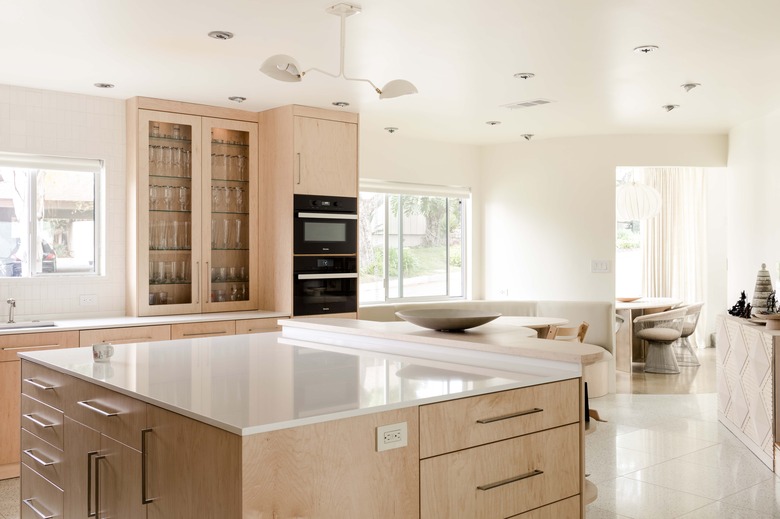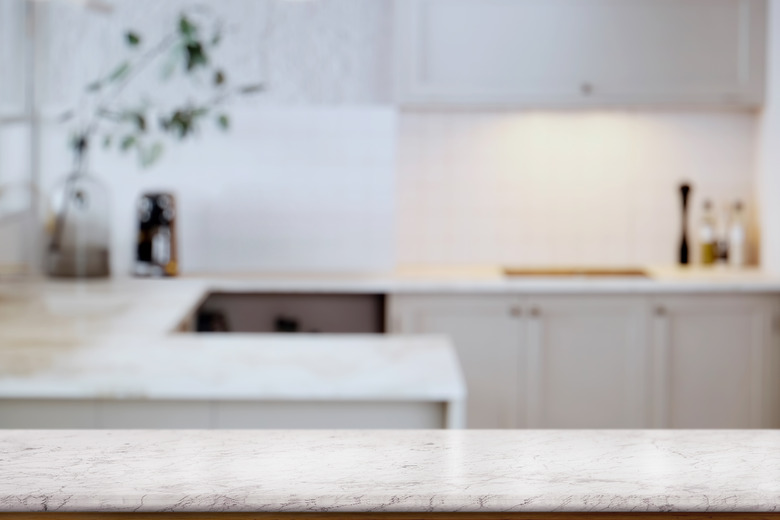Does Oven Cleaner Damage Kitchen Countertops?
Anyone who likes to cook is bound to have a buildup of hardened greases, oils and other carbonaceous materials on the inside of the the oven. You have to remove these periodically, or the taste of your food suffers and your oven gradually becomes a fire hazard. If you have a self-cleaning oven, all you have to do is initiate the self-cleaning function, wait overnight, and the oven will reduce the residue to ash.
If you don't have a self-cleaning oven, you need oven cleaner to do the job. The chemicals obviously have to be harsh, but are they harsh enough to damage your countertops if you spill some? The answer depends on the material on your countertop, which brand of oven cleaner you use, and how long you leave it on the countertop.
What's In Oven Cleaner?
What's In Oven Cleaner?
The most hazardous ingredient in oven cleaner is sodium hydroxide, or lye, and there's a certain amount in virtually every brand of the product. The concentration isn't high. In Easy-Off, a common brand, it's less than 10 percent, and in Ecolab Specialty Oven Cleaner, it's less than 1 percent. Other hazardous ingredients you find in many products include ethanol or monoethanolamine (MEA)— a mixture of ethanol and ammonia. Some products also contain sodium carbonate or soda ash, an alkalizer sometimes used in swimming pools. Other ingredients include foaming agents, emulsifiers, and fragrances. The net result is a spray foam that softens surface grease and penetrates to dissolved the charred remnants of greasy leftovers clinging to your oven walls so you can scrape them off.
Is Your Countertop Safe?
Is Your Countertop Safe?
Lye (sodium hydroxide), which is an ingredient in most products, has a history of use as a paint stripper, so you obviously don't want to get this on a surface that has been painted or sealed with a clear finish This includes many stone countertops, which are often sealed with polyurethane. The grout sealer on tile countertops is also vulnerable to lye damage. If you notice the spill and immediately wipe it off, you may dodge a bullet and avoid noticeable damage. Just to be sure, wipe the area down with vinegar, which is acidic and will neutralize any residual lye.
Alcohol (either ethanol or MEA) can also do bad things. It's a fairly powerful solvent, and while it's unlikely to eat into the countertop, it can cause permanent surface discoloration to vinyl, Corian, and other synthetic materials. This is especially likely if the the spill remains on the surface for several hours, but some homeowners have noticed discoloration to vinyl after simply wiping down the surface of a vinyl countertop with oven cleaner.
One more thing to remember. Sodium hydroxide reacts with aluminum to release flammable hydrogen gas in a complex, two-part process. The reaction may also result in permanent discoloration of the aluminum. You should never spray oven cleaner on aluminum.
Safe Alternatives to Commercial Oven Cleaners
Safe Alternatives to Commercial Oven Cleaners
You don't actually need to buy an oven cleaner, because you can make a paste that works just as well, using ingredients you already have. This concoction doesn't contain lye or alcohol, and it works just as well as commercial products, as long as you give it sufficient time to work. Here's how to make and use it:
- Combine 1 1/2 cups of baking soda with 1/2 cup of dish soap and 1/4 cup of household vinegar, then add enough water to make a paintable mixture.
- Apply it to the inside of the oven with a brush and leave it there for 6 to 8 hours or overnight.
- Remove the paste and softened oven grime by dipping a kitchen scrubber in a bowl of plain water and scrubbing it off. Change the water as needed.
You can also clean your oven with steam. Place a bowl filled with equal parts water and vinegar in the oven, set the temperature to 250°F, and leave it there for 30 minutes. Wipe off the residue with a damp sponge.

